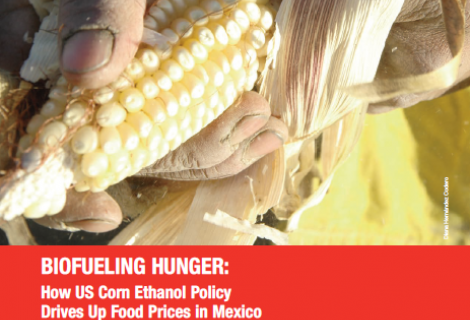
There is widespread agreement that biofuels expansion, with its direct diversion of food and feed crops and its indirect impact through competition for land and other food-producing resources, has been an important contributor to the rise in food prices over the last six years. Most researchers agree that the expansion of US corn ethanol has had particularly strong impacts. This has a deleterious impact on import-dependent developing countries.
This report looks at one import-dependent country and one crop to gauge the extent of those impacts. Ethanol-related price increases have negative impacts on consumers, particularly food-insecure consumers who are not farming and so do not see any gain fromhigher corn prices. Corn accounts for roughly 60% of the final cost of tortillas, Mexico’s staple, so a 20%
increase in corn prices from ethanol, transmitted to the Mexican market for white corn contributes to food insecurity.
With the 2012 Los Cabos summit approaching, Mexico is both an excellent case study of how biofuels contributes to rising food prices — and it is in a key role, as chair of the G20, to lead the effort to put an end to the biofueling of hunger once and for all. The Mexican government, as the current chair of the G20, has identified food security and food price volatility among the key issues it plans to address at this year’s summit. But it has yet to propose any action to address the role of biofuels in contributing to rising food prices. As this report shows, biofuels policies by the US are costing Mexico dearly just as similar policies by other G20 members are affecting the world. Mexico should use its position as chair to put biofuels policy on the table in Los Cabos.